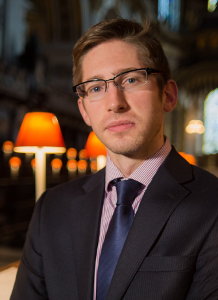Peter Holder (St Paul’s Cathedral)
Marche Heroique: Herbert Brewer
Chanson de matin: Edward Elgar (arr. Brewer)
Larghetto in F sharp minor: Samuel Sebastian Wesley
Andantino in D flat: Edwin Lemare
Triumphal March: Alfred Hollins
Interval
Toccata and Fugue in D minor, BWV 565: J S Bach (attrib)
Concerto in F No 13 “The Cuckoo and the Nightingale”: G F Handel (arr. Dupré)
“Carmen” Suite: Georges Bizet (arr. Edwin Lemare)

Many of you will remember Peter Holder at Southwell Minster. He is now at St Paul’s where he presides over that wondrous Father Willis / N P Mander instrument.
St Paul’s is associated with many state occasions, and appropriately Peter begins with the Marche Héroïque by Elgar’s friend Sir Herbert Brewer. This is practically an additional Pomp and Circumstance march in itself, with Elgarian energy in the outer sections and a noble big tune at its heart. This is followed by Brewer’s arrangement of Elgar’s gentle Chanson de Matin, a reminder that while Elgar enriched the musical world with three symphonies and three concertos (if you count the recent reconstructions) he was also a master of light music, as his own recordings show.
Elgar had a lifelong association with Worcester Cathedral. The other two Three Choirs venues, Hereford and Gloucester, owe much to the firebrand who presided over their music in the mid-nineteenth century, Samuel Sebastian Wesley, sometimes called the father of modern cathedral music and one of the first to realise the possibilities of the romantic organ.
One who realised those possibilities extremely well was Edwin Lemare, who gave the opening recital at the Albert Hall Nottingham in October 1910. His Andantino in D flat had a very successful new lease of life as the song “Moonlight and Roses”. Another “popular” organ composer was the blind organist Alfred Hollins, who was “discovered” in Nottingham and enriched the repertoire in many popular “orchestral” ways.
The most popular organ piece of all is cheerfully attributed to the youthful J S Bach. Its Toccata certainly tests an instruments “lungs”, something Bach liked to do, while its Fugue has several ear-tickling “echo” effects before its final grand peroration.
Bach’s exact contemporary Handel wrote several organ concertos, but for the much quieter English organs of the time. Two centuries later the great organist, composer and teacher Marcel Dupré revisited them in terms of the romantic organ. The one we are to hear takes its nickname from the birdcalls in its second movement.
Lemare had no doubts about what could be achieved on an organ, especially like the one in the Albert Hall which was designed to be equally at home performing transcriptions of organ music. Peter Holder’s recital ends with a visit to the riotous Seville of Bizet’s opera Carmen.
